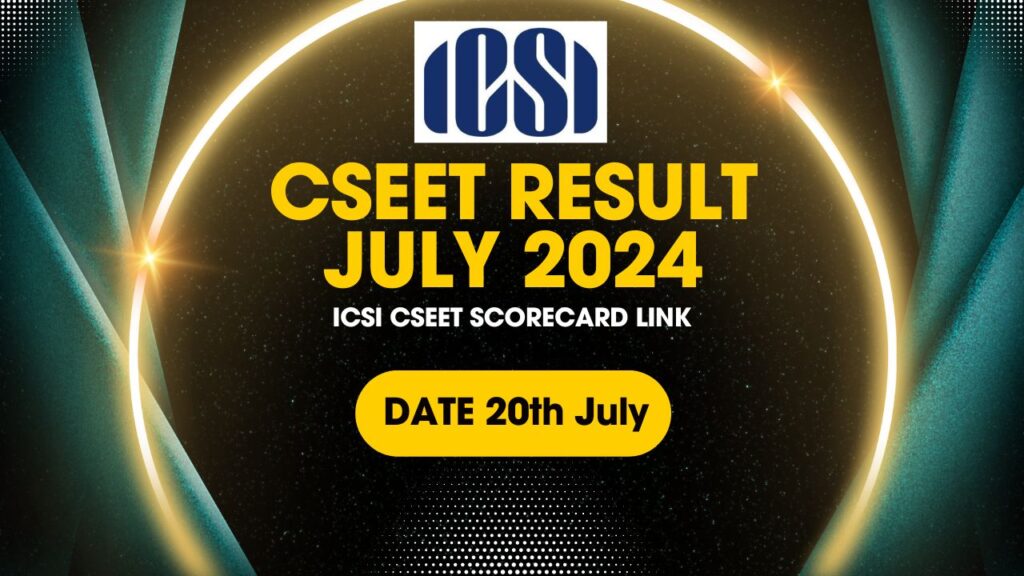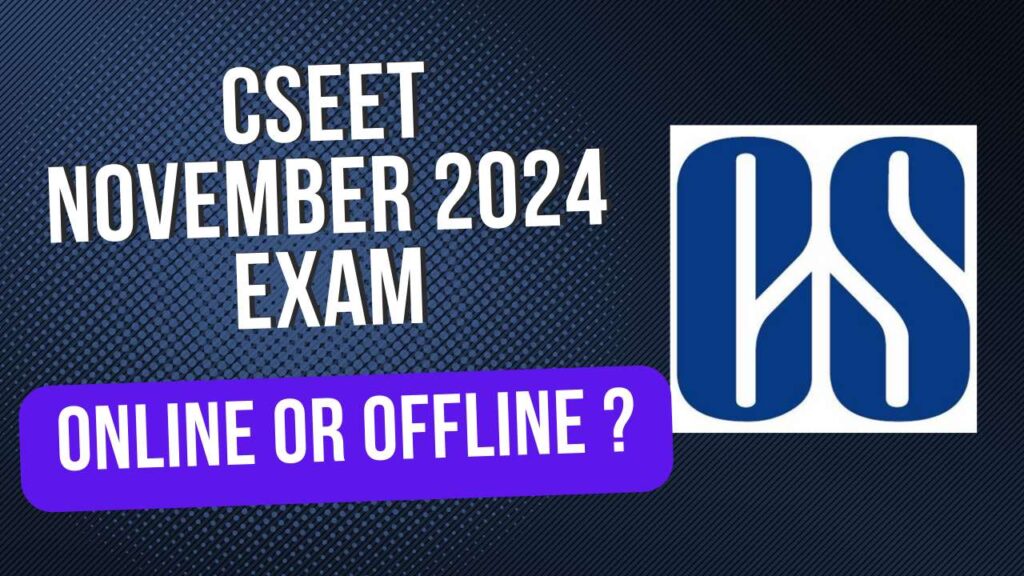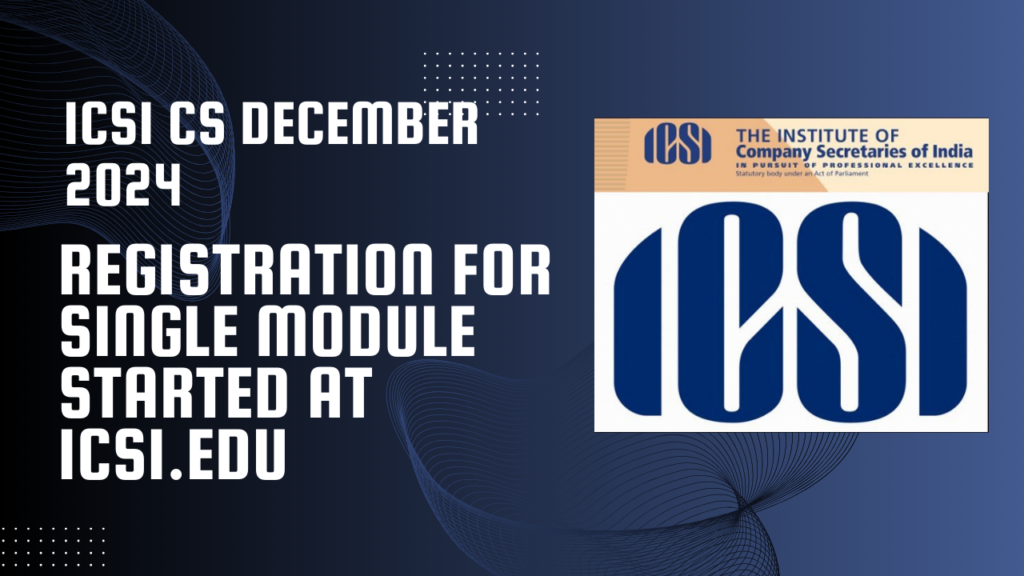As we all know that the subject of Taxation itself is very complicated by its own nature and a lot of provisions involved.
The complications further enhance due to its continuous refinement, amendments and changes which are very often brought by the various regulations especially in GST since its inception in 2017.
These regulations are released by the Government, sometimes to boost the economy, increase the revenue, lowering the taxation burden at the consumer end etc. But all these complications still don’t make this subject unimportant or inevitable from a learning perspective.
Considering all the importance which this subject/ topic holds for any professional student, this subject becomes one of the most important subjects of CS Professional examination. It is the second subject of the Module 1 of CS Professional.
As we know that CS Professional is the final stage of the professional course of Company Secretary. The professional stage is basically designed to inculcate skills and competence of professional program passed students.
The reason for inclusion of this important subject in the curriculum is to impart conceptual understanding to the students regarding provisions of Goods and Services Tax at advanced level under Indirect Taxes.
An outline of Company Secretary Courses and Specialisation- Professional Programme Papers
| Paper and subjects | Marks distribution |
| Module – 1 | |
| Paper – 1: Governance, Risk Management, Compliances and Ethics | Part I: Governance (50 Marks) Part II: Risk Management (20 Marks) Part III: Compliance (20 Marks) Part IV: Ethics & Sustainability (10 Marks) |
| Paper – 2: Advanced Tax Laws | Part I: Goods and Service Tax ‘GST’ (60 Marks) Part II: Customs Law (10 Marks) Part III: Direct Tax & International Taxation (30 Marks) |
| Paper – 3: Drafting, Pleadings and Appearances | Drafting, Pleadings and Appearances (Max Marks 100) |
| Module – 2 | |
| Paper – 4: Secretarial Audit, Compliance Management and Due Diligence | Part I: Compliance Management (40 Marks) Part II: Secretarial Audit &Due Diligence (60 Marks) |
| Paper – 5: Corporate Restructuring, Insolvency, Liquidation & Winding-up | Part I: Corporate Restructuring (50 Marks) Part II: Insolvency& Liquidation (50 Marks) |
| Paper – 6: Resolution of Corporate Disputes, Non-Compliances & Remedies | Resolution of Corporate Disputes, Non-Compliances& Remedies (Max Marks 100) |
| Module – 3 | |
| Paper – 7: Corporate Funding & Listings in Stock Exchanges | Part-A: Corporate Funding (60 Marks)Part B: Listing (40 Marks) |
| Paper – 8: Multidisciplinary Case Studies (open book exam) | Multidisciplinary Case Studies (Max Marks 100) |
| Paper – 9: Eight Elective Papers (open book exam) | |
| 9.1- Banking – Law & Practice | Banking – Law & Practice (Max Marks 100) |
| 9.2- Insurance– Law & Practice | Insurance – Law & Practice (Max Marks 100) |
| 9.3- Intellectual Property Rights– Laws and Practices | Intellectual Property Rights: Laws and Practices (Max Marks 100) |
| 9.4- Forensic Audit | Forensic Audit (Max Marks 100) |
| 9.5- Direct Tax Law & Practice | Direct Tax Laws & Practice (Max Marks 100) |
| 9.6- Labour Laws & Practice | Labour Laws and Practice (Max Marks 100) |
| 9.7- Valuations & Business Modelling | Part I: Valuations (70 Marks) Part- II: Business Modelling (30 Marks) |
| 9.8- Insolvency – Law and Practice | Insolvency – Law and Practice(Max Marks 100) |
An Overview of the subject
The subject is divided into three parts i.e.
Part I: Goods and Service Tax ‘GST’
Part II: Customs Law
Part III: Direct Tax & International Taxation
CS Professional Examination Syllabus of this subject
Before planning the study curriculum, first of all we should know the contents of the subject. Following is the arrangement Of Study Lessons in this subject
| Module-IPaper- 2Advanced Tax Laws Indirect Taxes Part I : GST and Customs Laws | 1 An Overview on Goods and Services Tax “GST” 2. Supply 3. Input Tax Credit & Computation of GST Liability 4. Procedural Compliance under GST 5. Assessment, Audit, Scrutiny, Demand and Recovery, Advance Ruling, Appeals and Revision 6. Inspection, search, seizure, offenses & penalties 7. GST practitioners, authorized representative, professional opportunities 8. Integrated Goods and Services Tax (IGST) 9. Union Territory Goods and Services Tax (UTGST) 10. GST Compensation to States 11. Industry/Sector Specific Analysis |
Strategy for Preparation
In the present time, taxation is not just a means of transferring money to the government to spend it for meeting the public expenditures or raise revenue to the government, but taxes have become beside that, as a tool for redistribution of income and wealth in the society.

It also serves as a means of economic development and plays a significant role in stabilization of income. Taxation assist in finding solutions to the economic problems which are faced by a country, like unemployment, inflation, and depression. Countries practice sovereignty authority upon its citizens, through levying of Taxes.
The reason for inclusion of this important subject in the curriculum is to impart conceptual understanding to the students regarding provisions of one of the most important reform of the country i.e. Goods and Services Tax
- To provide working knowledge on practical application of Direct Tax Laws and
- To provide conceptual knowledge of GST with practical application of GST Laws
Before reading further check out these posts
Strategy for Preparation
- Understanding the requirements of the subject-First of all the students should understand the requirement of the paper and subject thoroughly.
- Dynamic subject-At the same time the student needs to remember that it is not a static subject like accounts or costing rather it involves a lot of dynamic elements because the provision keeps on changing from time to time. Every time Finance Act is released by the Government in the month of Feb which brings a lot of changes in the existing provisions.
- Refer recent case laws-While preparing the examination, the student is required to refer relevant and important recent examples from current affairs happening in and around business.
- Solving Practice-A lot of practice is required for attempting and clearing this paper as this paper. It is recommended that a student should practice as many problems as its possible.
- Regular Updation- Update yourself about all the relevant circulars, clarifications, notifications, etc. issued by the CBDT, CBEC & Central Government, on or before six months prior to the date of the respective examinations.
- Fundamental topics of subject-Last but not the least, the students need to be aware of the fundamentals and key provisions, amendments to the Acts, Powers, features, and functions of the provisions of the acts, especially before the examination.

Now we will make a framework for studying and preparing this subject, chapter wise.
| Important topics to be covered | |
| Chapter 1An Overview on Goods and Services Tax “GST” | Introduction International Perspective of GST/VAT Application of Generally Accepted Principles of Tax Policy to VAT International Scenario of GST/VAT Need for GST in India GST Journey Provisions under the Indian Constitution Goods & Services Tax Council Introduction of GST in India Taxes Pre-GST Regime Legislative Framework of GST Advantages of GST Exemption from GST |
| Chapter 2Supply | Significance of Supply Meaning and Scope of Supply Meaning and Taxability of Composite and Mixed Supply [Section 8] Levy and Collection of Tax Levy and Collection [Section 9 of CGST Act, 2017] Composition Levy [Section 10 of CGST Act, 2017] Eligibility to Opt Under Composition Scheme Restriction on Collection of Tax [Section 10 (4) Procedural Aspects of Composition Scheme List of Forms Special Composition Scheme-Section 10(2a) [W.E.F 1.4.2019] Exempt Supply Power to Grant Exemption [Section 11] Services Exempt From Tax [Notification No. 12/2017- Central Tax (Rate)] Time of Supply Time of Supply of Goods [Section 12] Time of Supply of Service [Section 13 of CGST Act, 2017] Value of Supply Rules for Determination of Value of Supply Applicability of Valuation Rules Value of Supply of Services in relation to Air Travel Agent [Rule 32(3) of CGST Rules, 2017] Value of Supply of Services in relation to Life Insurance Business [Rule 32(4) of CGST Rules, 2017] Value of Second Hand Goods [Rule 32(5) of CGST Rules, 2017] The Value of Taxable Services between Distinct Persons [Rule 32(7) of CGST Rules, 2017] Value of Supply in Cases Where Kerala Flood Cess is Applicable (Rule 32a of the CGST Rules) Value of Supply of Services In Case of Pure Agent [Rule 33 of CGST Rules, 2017] Value Inclusive of All Taxes [Rule 35 of CGST Rules, 2017] Imports and Export of Goods and Services under GST Imports under GST Exports under GST Zero Rated Supply Procedure for Export of Goods under Bond or Letter of Undertaking Refund Of Input Tax Credit In Relation To Zero Rated Goods Or Services. [Rule 89(4)] Deemed Exports Classification of Goods and Services under GST Rule of Interpretation as Applicable in Customs [Equally Applicable for GST] Miscellaneous Provisions Job Work [Section 2(68)] Principal [Section 2(88)] Job Work Procedure [Section 143] Pure Agent Concept in GST E-Commerce Tax Collected at Source (TCS) Constitution of the Standing Committee and Screening Committees [Rule 123] Duties of Various Authorities |
| Chapter 3 Input Tax Credit & Computation of GST Liability | Input Tax Credit Definitions Eligibility and Conditions for Taking Input Tax Credit [Section 16] Transitional Provisions in ITC Ineligible Credits [Section 17] Procedure for Claiming Credit in Special Circumstances [Rule 40 of the CGST Rules] Treatment of Input Tax Credit in the Event of Transfer of Business, etc. [Section 18(3) and Rule 41] Transfer of Credit on Sale, Merger, Amalgamation, Lease or Transfer of a Business [Rule 41] Reversal of Credit under Special Circumstances [Section 18(4) and Rule 44] Input Service Distributor [Section 20 and Rule 39] Matching, Reversal and Reclaim of Input Tax Credit [Section 42] Payment of Tax, Interest, Penalty and Other Amounts [Section 49] Utilization of Input Tax Credit Subject to Certain Conditions [Section 49A] Order of Utilization of Input Tax Credit [Section 49B] |
| Chapter 4Procedural Compliance under GST | Registration Persons Liable for Registration Persons not liable for registration Compulsory registration in certain cases Procedure for registration – Statutory Registration Practical Aspects of Registration Cancellation or Suspension of Registration Revocation of cancellation of registration Other Provisions Relating to Registration Tax Invoice, Debit & Credit Note Electronic Invoicing (E-Invoicing) Bill of Supply Revised Tax Invoice and Credit & Debit Notes Accounts and Records Electronic Way Bill Procedure for the Generation of E-Way Bill Documents and Devices to be carried by a Persons-In-Charge of a Conveyance Verification of Documents and Conveyance Inspection and Verification of Goods Facility for uploading information regarding detention of vehicle Restriction on furnishing of information in Part A of Form GST EWB-01 Clarification on e-way Bill Payment of Tax Electronic Cash Ledger [Section 49] Electronic Liability Ledger [Section 49(7)] Electronic Credit Ledger Miscellaneous Provisions Interest on Delayed Payment of Tax Tax Deduction at Source (TDS) Collection of Tax at Source (TCS) Forms relating to Payment of Tax GST Return Mechanism Furnishing Details of Outward Supplies Furnishing Details of Inward Supplies Furnishing of Monthly Return Manner of Opting for Furnishing Quarterly Return [Rule 61A] Notifications Issued to Operationalise Quarterly Return Monthly Payment Scheme (QRMP) Returns by Persons Opting for Composition Scheme Returns by Non-resident taxable person Returns by persons providing online information and database access or retrieval services Return by an Input Service Distributor Return by a person required to Deduct Tax at Source Return by a person making supplies through an e-commerce operator First Return Nil Return through SMS Matching, Reversal and Reclaim of Input Tax Credit Annual Return Final Return Notice to Return Defaulters Levy of the Fee Forms relating to Returns Refund Consumer Welfare Fund Forms Relating to Refund Forms Relating to Assessment What is OIDAR? GST Compliance Rating GST on Director’s Remuneration Companies under IBC and GST Compliance |
| Chapter 5 ASSESSMENT, AUDIT, SCRUTINY, DEMAND AND RECOVERY, ADVANCE RULING, APPEALS ANDREVISI | Assessment Audit by Registered Dealer Audit by Tax Authorities Special Audit Demand and Recovery CGST Act Time Limit for Issue of Notice, Penalty and Adjudication under Section 73 Section 75: General Provisions Relating to Determination of Tax Section 79: Recovery of Tax Section 80: Payment of Tax and Other Amount in Installments Section 81: Cases where the Transfer of Property is Void Section 82: Tax to be First Charge on Property Rule 147: Recovery by Sale of Moveable or Immoveable Property Section 83: Provisional attachment to protect revenue in certain cases Section 84: Continuation and validation of certain recovery proceedings Rule 148: Prohibition against bidding or purchase by officer Rule 149: Prohibition against sale on holidays Rule 150: Assistance by police Advance Ruling – Objectives Procedure on receipt of application [Section 98] Procedure on receipt of application [Section 98] Appeal against the order of the Advance Ruling Authority [Section 99, 100 & 101] Appellate Authority for Advance Ruling Appeal to Appellate Authority National Appellate Authority for Advance Ruling [Section 101A, 101B and 101C] Appeal to National Appellate Authority Rectification of Advance Ruling [Section 102] Applicability of Advance Ruling [Section 103] Advance ruling to be void in Certain Circumstances [Section 104] Procedure for availing Advance Ruling Appeals & Revisions Appeal Hierarchy Statutory Provisions Appeals to Appellate Authority Powers of Revisional Authority President and Members of Appellate Tribunal Procedure before Appellate Tribunal Appeals to Appellate Tribunal Orders of Appellate Tribunal Financial and Administrative Powers of President Interest on Refund of Amount Paid for Admission of Appeal Appearance by Authorized Representative Appeal to High Court Appeal to Supreme Court Sums due to be Paid notwithstanding Appeal Appeal Not to be Filed in Certain Cases Non-Appealable Decisions and Orders Pre-Deposit for Filing Appeals |
| Chapter 6 INSPECTION, SEARCH, SEIZURE, OFFENCES & PENALTIES | Inspection, Search, Seizure & Arrest Power of Inspection, Search and Seizure (Section 67) Inspection of goods in movement (Section 68) Arrest Provision under GST (Section 69) Power to summon persons to give evidence and produce documents (Section 70) Access to business premises (Section 71) Officers to assist proper officers (Section 72) Relevant Forms to be used at a Glance Search and Seizure Powers of Authorized Officer Places where search can be conducted Reason to believe Particulars of search authorization (warrant) Period for retention of documents or books Procedure for releasing the seized goods Seizure of perishable and hazardous nature goods Search without valid warrant is illegal Validity of documents seized during illegal search Applicability of the Code of Criminal Procedure to Search & Seizure Guiding Principles for conduct of search Inspection of goods in movement Distinction in law between ‘Seizure’ and ‘Detention’ Time limit for detention of conveyance carrying goods Documents to be carried by the person in-charge of conveyance Access to Business Premises Assistance from Officers of other Departments Summons Obligations of a person who has been issued and served with a summon Nature of summon proceedings Offenses and Penalties Meaning of Offenses and Penalty Specified Offenses Liable to Penalty Other offenses for which penalties have been prescribed General Principles related to Penalty Voluntary disclosure to tax authorities |
| Chapter 7 GST PRACTITIONERS, AUTHORISED REPRESENTATIVE, PROFESSIONAL OPPORTUNITIES | Who May be a GST Practitioner? Concept of GST Practitioner (GSTP) Relevant Rules of CGST Rules, 2017 Rule 83. Provisions relating to a goods and services tax practitioner Examination of GST Practitioners Prescribed forms for GST practitioner Eligibility Criteria for becoming GST Practitioner Goods & Services Tax Practitioner – Responsibilities Functions of a Goods & Services Tax Practitioner [Rule 83(8)] Appearance by the Authorized Representative Relevant rule of CGST Rules, 2017 Who can be an authorized representative? Distinction between Authorized Representative and GST Practitioner Professional Opportunities under GST Specific Recognition to Professionals in GST Laws Role of Professionals Enhanced Role of Company Secretaries |
| Chapter 8 INTEGRATED GOODS AND SERVICES TAX (IGST) | Need for IGST The IGST model Constitutional Mandate Determination of Nature of Supply Inter-State Supplies under GST Intra-State Supplies under GST Supplies in territorial waters Place of Supply of Goods or Services or Both Refund of Integrated Tax to International Tourist Zero Rated Supply Difference between Exempt Supply and Zero-rated Supply |
| Chapter 9 UNION TERRITORY GOODS AND SERVICES TAX (UTGST) | Determination of Nature of Supply Levy of UTGST Utilization of Input Tax Credit Current Status of Union Territories Illustrations on Levy of Tax Supply within the Union Territory Supply outside the Union Territory |
| Chapter 10 GST COMPENSATION TO STATES | Structure of the Goods and Services Tax (Compensation to States) Act, 2017 506 Levy and Collection of CESS [Section 8] 507 Analysis of Section 8: GST Compensation Cess 507 Returns, Payments and Refunds- Relating to Cess (Section 9) 512 Compensation Cess on Goods Exported 513 Provisions Regarding Compensation Payable to States [Section 7] |
| Chapter 11INDUSTRY / SECTOR SPECIFIC ANALYSIS | The Institute Of Chartered Accountants of India Health Care Services Hotels and Restaurants GST on Accommodations in Hotels GST on Rent-a-cab services provided by hotels GST on foreign currency exchange services Input Tax Credit (ITC) Education and Commercial Coaching / Training |
Study Plan
1. Ensure complete understanding of the CS Study Material
2. Start with a proper Time Table
3. Setting targets
4. Analysing the actual performance every week
5. Never Do following-
- Never go with selective topics
- Never refer old study material
- Try to finish your revision beforehand
Some reference books
1. V.S. Datey GST Ready Reckoner, Taxmann
2. Taxmann’s GST Manual with GST Law Guide & GST Practice Referencer
3. Taxmann’s GST Acts with Rules & Forms
4. Vineet Gupta & N.K. Gupta GST – Law, Practice & Procedures – Bharat Publications
5. Notifications & Circulars cbic.gov.in


















